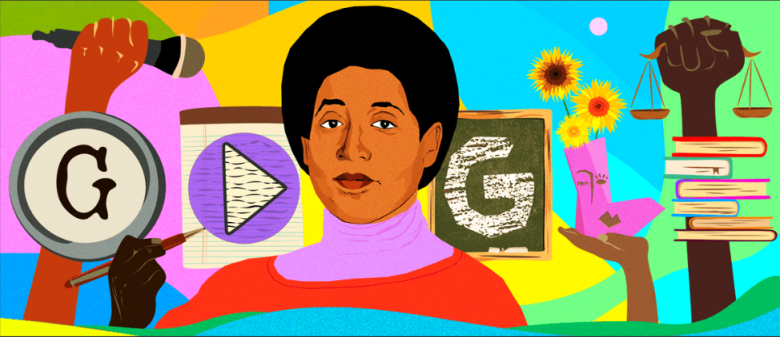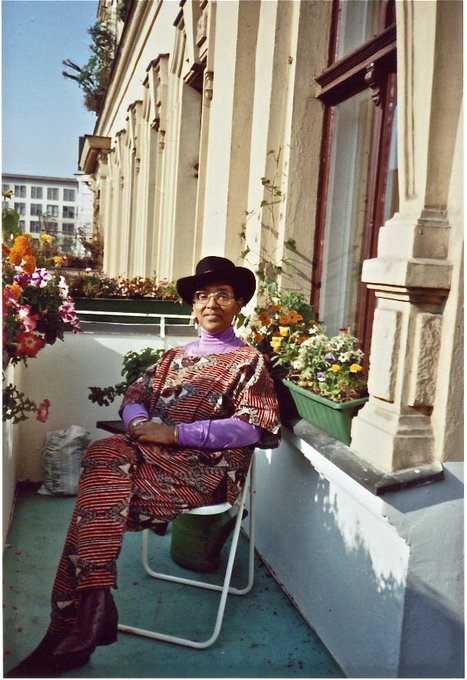
Audre Lorde, an internationally acclaimed poet, professor, feminist, civil rights champion and LGBTQ+ advocate was honored in the Google Doodle today, February 18, 2021 as a part of Black History Month. The Doodle was illustrated by Los Angeles-based guest artist Monica Ahanonu.
“For Lorde, poetry was more than just a form of emotional expression, it was a way of life–providing the vehicle for her lifetime advocacy against discrimination and racial injustice,” Google writes.
Lorde, a key activist in the 20th Century for civil rights and the LGBTQ+ community, would have been 87 today. The Google Doodle was published in honor of her birthday. The Google Doodle had eight panels and included quotes from one of her most recognized works, “Learning from the ’60s,” an essay published in 1982.
The quote says:
There is no such thing as a single-issue struggle because we do not live single-issue lives… Our struggles are particular, but we are not alone…What we must do is commit ourselves to some future that can include each other and to work toward that future with the particular strengths of our individual identities.
Here’s what you need to know:
1. Lorde Was an Introverted Child & She Began Expressing Herself Through Poetry After a Librarian Taught Her to Read & Write; She Was Published in Seventeen Magazine at Age 15
The influential works of Lorde may have never been written if it hadn’t been for a librarian, Augusta Baker, who taught her to read and write. Baker was her neighborhood librarian and an influential figure in her life, according to Google. Lorde, whose full name was Audre Geraldin Lorde, was born on February 18, 1924 to Caribbean immigrant parents in Harlem, New York City. She attended Hunter High School, a public school for gifted girls, becoming its first Black student.
Lorde was an introverted child, and after she learned about poetry, she began expressing her feelings through the medium. When she was asked how she was, she would often respond through a poem she had memorized.
She told Black Women Writers:
I used to speak in poetry. I would read poems, and I would memorize them. People would say, well what do you think, Audre. What happened to you yesterday? And I would recite a poem and somewhere in that poem would be a line or a feeling I would be sharing. In other words, I literally communicated through poetry. And when I couldn’t find the poems to express the things I was feeling, that’s what started me writing poetry, and that was when I was twelve or thirteen.
By the 8th grade, she was already writing her own poetry. At age 15, in 1951, she became a published author. Her poem, “Spring,” was published in Seventeen Magazine after it was rejected as unsuitable by her school’s literary journal.
Her first book of poetry, “The First Cities,” was published in 1968 and confronted homophobia and racism. Her work “explored identity and sexuality, while demanding social and racial justice—not only in the United States, but also abroad,” Google writes.
2. Lorde Described Herself As ‘Black, Lesbian, Mother, Warrior, Poet’ & Helped Spur the Feminist Movement in Germany
Lorde spent time in West Germany between 1984 and 1992 and taught poetry at the Free University in Berlin, according to Google. There, she also organized the local feminist movement through leading lectures and workshops on feminism, homophobia, classism, and racism.
She served as a mentor to Black German women and encouraged them to shape their own identities. Her “guidance was influential in sparking the Afro-German movement of the ‘80s,” Google writes.
She hosted “Poetry Readings & Rap Sessions” at The Academy of American Poets & The New York Public Library in 1971, according to a flyer published at the time. It says admission was free and “teenagers specially invited.”
In her bio printed on the flyer, she says she is “black, woman and poet,” “outside the realm of choice.” She writes that she began teaching after spending time as a poet in residence at Tougaloo College in Jackson, Mississippi.
“…I became convinced, anti-academic though I am, that poets must teach what they know if we are to continue being,” she wrote.
3. Lorde Co-Founded ‘Kitchen Table: Women of Color Press’ to Promote Black Feminist Writers
Lorde and Barbara Smith, another writer, founded “Kitchen Table: Women of Color Press” in 1981 as a way to support other Black feminist authors, according to the Poetry Foundation. The group is now called “Kitchen Table Literary Arts.”
Today, Kitchen Table “builds awareness, appreciation, and support for women of color and black women writers, poets, and their work,” its website says. The organization hosts workshops and other educational resources, encourages reading works by women of color through book clubs and connects women of color writers to each other and to resources.
“In 1980, activist, feminist, writer, and scholar Barbara Smith started a press ‘to make visual the writing, culture, and history of women of color,'” the organization’s website says. “At the urging of poet Audre Lorde and a collective of other poets, writers, and essayists, Smith set out on the inspired and passionate tasks of building the mission, goals, and reach of the Kitchen Table Press. She chose the name, ‘Kitchen Table,’ because that sturdy, purposeful gathering place is ‘the center of the home, the place where women in particular work and communicate with each other’ (Smith, 1989).”
4. Lorde Married a White, Gay Man Named Edward Rollins & They Had 2 Children
Lorde married her husband, Edward Rollins, a white gay man, and the couple had two children, Elizabeth Lorde-Rollins and Jonathan Rollins. Lorde and Rollins were divorced in 1970. She went on to forge a relationship with her longtime partner, Frances Clayton, according to the Poetry Foundation.
Her children described her as “a complicated and passionate woman” in a statement to Google.
They wrote:
Audre Lorde was a complicated and passionate woman. She was as passionate an educator as she was a fighter. It was very important to her that her work be useful—and she would be enormously gratified to know that her words are now used as a rallying cry of people fighting for justice all over the world. She also loved life: she loved to dance and to hunt for rocks. She loved candy bars. And she loved the people close to her, fiercely.
5. Lorde Died Nearly 20 Years Ago From Breast Cancer in 1992 & Wrote About Her Battle With Cancer in ‘The Cancer Journals’
Lorde died in 1992 after a 14-year battle with breast cancer. She wrote about her battle with cancer in “The Cancer Journals,” published in 1980, according to the Poetry Foundation. Her awards and honors included a fellowship from the National Endowment for the Arts. She was a professor of English at John Jay College and Hunter College, and became poet laureate of New York from 1991-1992. Lorde was awarded the American Book Award in 1989. She also worked as a librarian at New York Public Libraries in the 1960s.
Her children, Elizabeth Lorde-Rollins and Jonathan Rollins, said she would have been thrilled about the feature on Google.
Her children said in a statement:
Our mother Audre Lorde died in 1992 after a fourteen-year battle with metastatic breast cancer, but she would have loved the Google Doodle. She loved learning new things–and she would have been very honored to be featured. As mentioned above, she received her Master’s degree in Library Science because she was very big on cataloging information in an orderly fashion so it could be located, even if centuries separated the knowledge from its seeker. How she would have enjoyed sitting down to a keyboard and having worlds of knowledge open at the typing of a few key words or phrases!

